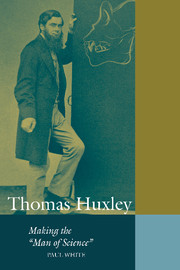Book contents
- Frontmatter
- Contents
- Illustrations
- Acknowledgments
- Introduction
- 1 Science at Home
- 2 Gentlemen of Science? Debates over Manners and Institutions
- 3 Science as Culture
- 4 The Worship of Science
- 5 “Darkest England”: Science and Labor in the 1880s and 1890s
- Conclusion: The End of the “Man of Science”
- Bibliography
- Index
- Frontmatter
- Contents
- Illustrations
- Acknowledgments
- Introduction
- 1 Science at Home
- 2 Gentlemen of Science? Debates over Manners and Institutions
- 3 Science as Culture
- 4 The Worship of Science
- 5 “Darkest England”: Science and Labor in the 1880s and 1890s
- Conclusion: The End of the “Man of Science”
- Bibliography
- Index
Summary
In 1894, Thomas Huxley wrote to the editor of Science-Gossip magazine, criticizing the appearance in its pages of a vulgar Americanism – the word “scientist.” For Huxley, the term denoted the sort of technical practitioner who was valued in a nation ruled solely by concerns for utility. Such a nation, he suggested, was so culturally impoverished that it fabricated words like “electrocution” (coined from “electricity” and “execution”), thereby associating science with an instrument of death, simply for linguistic economy. “Scientist,” he implied, was undignified for a person of his caliber, and improper for the community of which he was a member – men of broad learning and moral gravity, capable of pronouncing on matters of general interest. From the mid-1840s, the expression that he and other professional practitioners had used for self-designation was “man of science.” It was a title that, in common with those denoting other cultural leaders of the period, such as men of letters or clergymen, was free from the connotations of intellectual or commercial narrowness that could prevent men in Victorian England from entering elite circles of learning. As a community, Victorian men of science may have differed from the “natural philosophers” of the eighteenth and early nineteenth centuries in their sharper sense of distinction from other forms of learned activity (such as literature) and in their antipathy toward patronage.
- Type
- Chapter
- Information
- Thomas HuxleyMaking the 'Man of Science', pp. 1 - 5Publisher: Cambridge University PressPrint publication year: 2002

